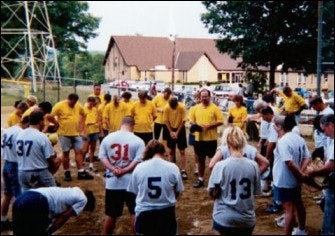Sports Ministry Programs - From Church-Run Sports Leagues to Full-Fledged Fitness Centers - Are Taking Athletics and Recreation in a Whole New Direction

This summer, the Canton (Ohio) South branch of the Central Stark County YMCA approached its next-door neighbor, North Industry Christian Church, and asked recreation officials there to take over the Y's fledgling tee-ball league. "We did nothing more than put somebody specifically in charge of the program and add simple elements to the game," explains Jeff Franks, the church's sports and outreach minister - as in ordained minister. "We gave the kids cookies after every game. We had 'character huddles' while they ate their cookies, and we talked about the importance of honesty and sharing. These are not complicated things, but they added a whole new realm to the program. From our ministry perspective, it was a natural."
Sports ministry programs like North Industry's - ones that essentially promote Christian values and teachings through sports leagues and recreation activities - are impacting communities around the country by partnering with area YMCAs, high schools and municipal parks and recreation departments on programming and facility usage.
"We've really come to see one another as allies, rather than competitors," says John Byers, director of recreation at Tabernacle Presbyterian Church in Indianapolis, which has emerged as one of the city's largest and premier administrators of sports leagues for kids between the ages of 5 and 14.
"We try to do the little things that the park districts won't do - or can't do - like send birthday cards or go see a kid in the hospital," adds Randy Kiger, minister of recreation at the Chicago First Church of the Nazarene in Lemont, Ill. "That's not a park and recreation department's job, anyway. But here, it is our job. In the end, we wind up feeding the park and rec programs, and they send kids to us, too."
Indeed, nearly all of the 3,500 annual participants in youth and adult leagues at First Church of the Nazarene are not members of that congregation - some aren't even members of any congregation. Likewise, up to 95 percent of the 2,000 or so kids who play in Tabernacle Presbyterian's youth leagues each year come from families who don't belong to the church. "The whole idea is that kids and their parents who might not come into our sanctuary will come into our gym or onto our fields," Byers says. "If you make it comfortable for them there, then they might find their way into the sanctuary. But even if they never join our church, they still need to hear the message and they still need to experience some fellowship."
"We mix sports and Christ, plain and simple," says Kiger, who incorporates Bible devotions and prayer cards into sports and recreation activities. "We offer what we know, what we believe. And if people want to be a part of that, great. If not, that's OK, too."
Increasingly, churches and their communities want to be a part of the growing sports ministry movement. While not a new concept - the Southern Baptists are generally cited as the first denomination to develop community outreach athletic and recreation programs decades ago - sports ministry has made its greatest progress within the past five years. More than a dozen Christian colleges now offer degrees in sports ministry, and an Ohio-based organization called the Association of Church Sports and Recreation Ministers strives to enhance public perception of the ministry. Several regional and national ministry programs targeting individual sports - Upward Basketball, Hockey Ministries International and Hoops of Hope among them - are gaining in size and stature, and some denominations even sponsor sports ministry workshops.
"It's a growing phenomenon that people are seeing as a preferred alternative to the win-at-all-costs attitude of secular programs," says Rodger Oswald, a former high school English teacher and coach who in 1992 founded Church Sports International, a nonprofit organization that helps churches establish community outreach sports ministry programs. "We do not blatantly proselytize. We don't go out and beat people over the head with the Bible. The thing that separates a good church recreation program from secular programs is, first and foremost, the effort to create an environment for people to enjoy the sport and each other. Plus, we care about the spiritual side of people."
Ah, there's the rub that's causing some observers to chafe. Granted, church-sponsored sports leagues operate in significantly different ways from so-called secular leagues. Frequently, no one keeps score or logs game statistics in youth leagues, and alcohol use may not be permitted during adult games. Plus, weekly practices and games are limited, and time is built in for prayer, witnessing or fellowship. "Since the church is sponsoring the program, it's not a big shock that the church wants to share the news of Christ," says one church's recreation director.
But the fact that houses of worship, long considered tax-exempt institutions, are charging the public to participate in those leagues - even if the fees cover only league expenses - has become a sticking point in some communities. Stickier still is the issue of churches operating fitness centers (or life centers, as many congregations call them, where dress and language codes are often enforced) and charging community residents for memberships that are competitively priced with local for-profit health clubs. "There are a lot of churches that are going to end up in trouble, because churches are not identifying that type of facility as a for-profit entity," Oswald warns.
In some cases, though, life centers aren't for-profit operations. Take Body+Soul, the sports ministry outreach facility operated by Atlanta's Peachtree Presbyterian Church, which with 9,500 members is the largest Presbyterian congregation in the nation. Body+Soul - a $6 million, four-story, 66,000-square-foot facility - opened in 1999 and boasts a three-court gymnasium, several pieces of cardiovascular and strength equipment, a track, group-exercise rooms, music-rehearsal spaces and classrooms. "We expect that this will be a break-even operation," says Bill Maness, Peachtree Presbyterian's recreation director, adding that many Atlanta churches operate similar life centers. "It's an extension of the church, but it will not cost the church money that is given through tithing. Our objective is that we operate this at no cost to the church, but also at no profit."
So far, there have been few reports of for-profit clubs actually taking action against a church - although Maness received a letter from a local club operator shortly after Body+Spirit opened. He replied with a letter of his own, explaining that Peachtree Presbyterian was not trying to put any other facilities out of business. "We never heard from him again," Maness says. "I think he was just sort of making a point."
In Wells, Maine, earlier this year, Heart & Muscle (a for-profit club) objected to the opening of Messiah Christian Church's fitness center, which sells annual memberships to the community for $300. Backed by the International Health, Racquet and Sportsclub Association (IHRSA), which is leading the fight against tax-exempt fitness centers, including YMCAs and YWCAs, the club's owner claimed the church qualified as a competing, commercial operation that should be taxed. Kathy Chase, the city's tax assessor, begged to differ and determined that the church meets the criteria for a benevolent and charitable organization and is exempt from annual property taxes of $6,000.
"It's a very volatile point to bring up," says Helen Durkin, director of public policy for IHRSA. "I think we're hard-pressed to see how having a large fitness facility falls under what a church should be doing on a tax-exempt basis. I think the Ys have a better argument than the churches do."
Church leaders themselves are divided on the issue. "I don't agree with churches opening fitness centers up to everyone and then calling them nonprofit facilities," says Henry Castro, founder of Miracle Fitness Ministries, a sports ministry consulting firm in Newbury Park, Calif. "You're still making money." (It should be noted that Castro also owns two Angel City Fitness facilities, 22,000-square-foot for-profit centers located in Newbury Park and Marina Del Rey.)
Valley Grove Baptist Church in Knoxville, Tenn., avoids any dispute with for-profits by only opening its $5.1 million, 67,000-square-foot Family Life Center to the 1,000-plus members of its congregation. Community residents are allowed free 30-day trial memberships, but with the understanding that someone from the church will visit their home to discuss the benefits of the Baptist faith and Valley Grove Baptist Church. "We're not here to ruin the local gyms," says Paul Bowman, the church's minister of recreation and senior adults. "Making money is not a factor here. We don't need to start up a specific program just because it will bring in top dollar. Most churches don't do it for the money. I can't imagine that we've pulled more than 10 people out of another club."
Durkin agrees, estimating that the nationwide number of for-profit health clubs that actually feel threatened by a church-operated fitness facility is quite small. "We don't have a specific position paper on churches," she says. "I think you could categorize them as a blip on our radar at this point."
Even a blip is more than churches used to register on the fitness, recreation and athletic front. The earliest attempts at church recreation - spearheaded by YM/YWCAs (Young Men's and Women's Christian Associations), Catholic Youth Organizations and the efforts of individual churches of various denominations - were more self-centered and geared strictly toward members of respective congregations. Tabernacle Presbyterian, for example, offered baseball and basketball programs as early as 1924.
But after the Southern Baptists experienced widespread success in attracting new members via sports and recreation programs during the 1950s and 1960s, other denominations slowly turned a blind eye toward the typical religious stereotypes associated with athletics, recreation and fitness - namely, vanity and the worshiping of false gods. "Years ago, you wouldn't catch pastors dead in a gym," Castro says.
So churches with open-minded pastors and forward-thinking leaders began to create their own programs and leagues, budgeting gymnasiums, climbing walls and even swimming pools into new building projects or purchasing nearby land for fields, obstacle courses or future construction. If no building funds or additional outdoor spaces were available, some churches would develop activities that could be conducted in basements or other existing spaces. Recently, churches clinging to tight construction budgets have opted to build combination worship spaces and gymnasiums - sometimes dubbed "sanctanasiums." At Faith Christian Church in Bradenton, Fla., for example, a $1.2 million hall features basketball court lines in the carpeting. Chairs and the baptismal font can be removed and stored, and portable basketball goals wheeled in, opening up the floor for pickup games and organized play.
"That approach can be very limiting for sports," Kiger admits. "If I was building a new facility, I'd put in a room specifically designed for recreation."
When you consider that Your Church magazine estimates churches of all denominations spend more than $49 billion a year on everything from altars to basketballs, the potential for crossover by secular organizations and suppliers is great. Add in the fact that churches undertake 6,000 new construction or renovation projects every year, and sports ministry becomes a viable option for architects, too.
While a church architect may better understand the spatial relationships between a sanctuary and its related areas, they often don't have a firm grasp of the best way to incorporate sports into a facility, says Franks, who's been involved with church recreation facilities designed by both church architects and sports architects. "I haven't heard any horror stories either way, although I will tell you that if you're a church looking to do some of the construction work yourself or on a voluntary basis with members of your congregation - which is quite common - a church architect will be more open to that," Franks says. "That's not a realm sports architects may understand."
Nevertheless, the potential remains for sports architects to educate church leaders about the types of facilities available to them, as well as the importance of staffing those facilities with experienced sports or recreation personnel. A sports architect also might be able to convince church planners to, say, abandon the idea of constructing a gymnasium's lower walls with glass block, whose fragility would prevent the facility from being used by in-line skaters.
But architects aren't the only segment of the athletic, fitness and recreation industries that can find a stronghold in the sports ministry market. The National Alliance for Youth Sports has teamed up with a handful of churches to market their Parents Association for Youth Sports (PAYS) program' which addresses ways to prevent negative parent behavior, educate parents about their roles and enhance parent/league relationships. "We know the message we're trying to send, and our coaches know the message we're trying to send, but parents weren't on the same page as the rest of us," says Tom Gaden, director of recreation ministries at First United Methodist Church in Houston, which implemented an attendance-optional PAYS program last fall. Gaden's goal is to have 100 percent parental participation in the program by 2003.
Kiger distributes NAYS material every chance he gets - to participants in his church's programs or to fellow attendees at the international Nazarene General Assembly. His youth programs include an elaborate end-of-the-season awards ceremony (all participants receive a trophy) and a party with live Christian music, free food and games - all of which help make sports leagues at First Church of the Nazarene immensely popular with both kids and parents, who eagerly volunteer their services. "Sometimes I have to turn coaches away, because I've got so many," Kiger says.
Money can't buy that kind of publicity. But not all sports ministry programs grow as quickly. "Recreation is not a magic cure-all," Bowman admits. "We were told that our church congregation would double once we opened the Family Life Center. That just didn't happen." He attributes the addition of about 100 new members in two years directly to the center.
And in many communities, the perception of church recreation remains tainted. "The knock on church programs is if you're a good athlete, you go to the secular leagues. If you're not, you go to the church leagues," Oswald says. "Plus, some churches still adhere to the archaic notion that you can't play in a church league if you don't come to church every week. It used to be like a holy huddle, where members of the church would gather in their gyms and have their own little fun. But you just can't mandate righteousness. If you have that exclusive mind-set, you are contradicting the fabric of your faith."
Unfortunately, according to Oswald, some churches use the guise of Christianity to shroud a win-at-all-costs attitude that sometimes makes it difficult to tell the difference between church-league competition and secular-league competition. "We start games off with a prayer, but once competition begins, that goes out the window," confesses one church recreation director. "Church leagues might be a little less cutthroat, but Christians can get evil, too."
Yet, such examples appear to be the exception. "We don't play Christian music in Body+Soul, and we don't preach to people when they work out," Maness says. "I don't want people picking certain scriptures out of the Bible and determining that that is God's way of telling them to lose weight. Because if they fail, they'll feel their faith isn't strong enough. We just try to be the church of Jesus Christ in the way we present ourselves, through our ambience. People have trouble putting it into words, but they say, 'You know, I like what I'm experiencing here.' "




































